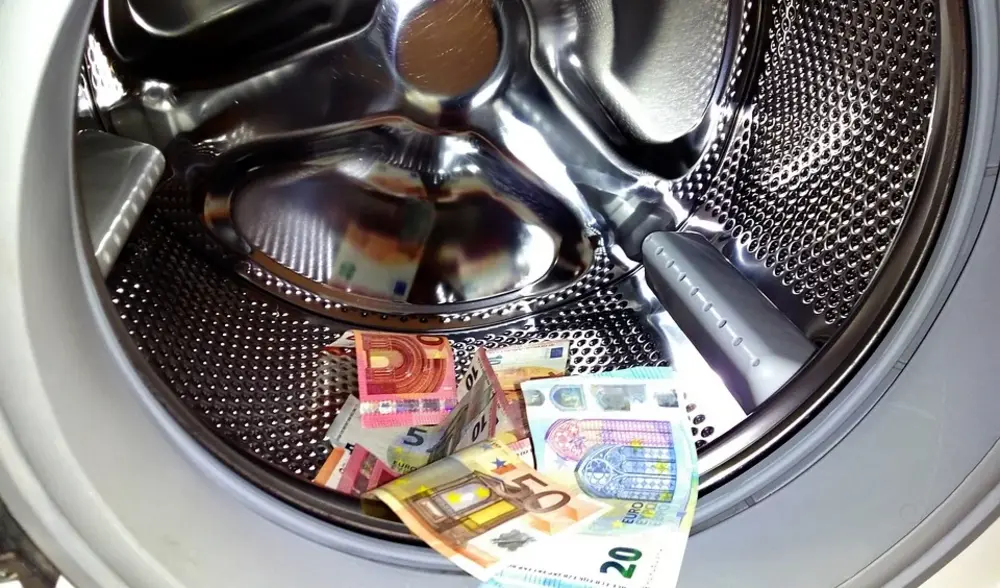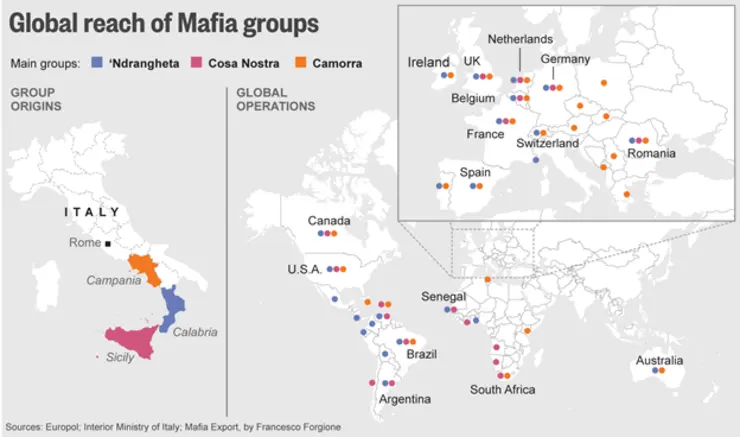The Effects of the Italian Mafia in Germany

The Italian mafia has societal roots so deep that the word “mafia” is internationally understood to be associated with criminal organizations. In the 1980s, Italy cracked down on mafia groups and laws were created to make mafia operations more difficult. Although the mafia is still present in Italy, the tightened rules caused the mafia to turn more to the international scene to conduct their illicit activities involving various types of transnational organized crime.
The Italian Mafia Families
The main mafia families in Italy are Cosa Nostra, ‘Ndrangheta, and the Camorra. Although they all engage in some type of transnational organized crime they all use Germany primarily as a source of money laundering.
Cosa Nostra, known as the Sicilian Mafia, has its origins in Sicily (as seen in the map below) and is the oldest and most traditional mafia group in Italy. Cosa Nostra is arguably the most famous criminal organization in the world due to its overwhelming presence in literature and film. The word “mafia” is most famously associated with the novel and movie “The Godfather” which romanticized the Sicilian Mafia. In Sicily, Cosa Nostra is known for its heavy influence in politics, society, and economy. Internationally, Cosa Nostra keeps a low profile and focuses its influence on economies. They have infiltrated economies through legitimate businesses in Canada, the US, Venezuela, South Africa, etc. Their main criminal activity is money laundering followed by cocaine trafficking.
‘Ndrangheta is based in the Calabria region of southern Italy, and it is considered one of the richest and most powerful organized crime groups in the world. Their wealth and extensive legitimate business network has also allowed them to form quasi-monopolies in construction, real estate, and transportation industries, which gives them power over economies. They use their legitimate businesses in other countries to facilitate drug smuggling and to launder their illicit profits (EUROPOL, 2013). ‘Ndrangheta’s partnerships with Mexican cartels has made them Europe’s largest cocaine importer with an annual profit of about 55 billion euros. ‘Ndrangheta has established a strong presence in Western Europe, Mexico, Columbia, Canada, and the US (EUROPOL, 2013).
The Camorra is located in the Campania region of Italy and it is known for their activity in the sale of counterfeit goods. They produce goods, such as clothing, themselves and also have partnerships with producers from Chinese organized crime groups. The Camorra is also involved in drug trafficking, cigarette smuggling, and illicit waste dumping. Their main areas of influence include Eastern and Western Europe, the United States, and Canada (EUROPOL, 2013).
Why Germany?
The main mafia operations in Germany are drug trafficking, counterfeiting, and automobile smuggling, followed by money laundering to clean profits to be sent back to Italy. The main economic areas for money laundering are real estate, restaurants, retail businesses, and construction (Sciarrone & Storti, 2013). Germany’s location, economic situation, and lax laws have caused the country to become a hub for Italian mafia groups. The country’s Port of Hamburg and the proximity to the Port of Rotterdam, the largest port in Europe, make Germany a strategic point for international drug trafficking.
These mafia groups have also benefited from the economic turmoil created after Germany’s reunification in 1990. At the time, the former DDR states were in need of private investments and did not prioritize countering organized crime. ‘Ndrangheta and Camorra took advantage of the situation and began investing in these states. It is estimated that the mafia has invested at least €100 million in Erfurt alone (MDR Thüringen, n.d.). ‘Ndrangheta cells can also be found in Leipzig, Frankfurt, Duisburg, and in several cities throughout Baden-Württemberg, Camorra cells have been identified in Dortmund, Düsseldorf, and Berlin, and Cosa Nostra cells have been found in Cologne and Wuppertal (Sciarrone & Storti, 2013).
Compared to Italy, Germany has lax laws aimed to counter transnational organized crime carried out by mafia groups. Since Italian laws have tightened it has encouraged mafia groups to seek ways around the laws. Germany presents this opportunity. In Italy, it is required for new businesses to prove that their funds are not from illicit means. Therefore, mafia groups operate their businesses in Germany in order to provide a legitimate source of funds for reinvesting in Italy (MDR Thuringen, 2019).
The presence of the Italian mafia in Germany was denied for years until the Duisburg Massacre in 2007. A rivalry between two ‘Ndrangheta clans began in the 1980s in Italy and culminated in 2007 when one clan killed six members of their rivals outside of an Italian restaurant in Duisburg, Germany. Since then, media attention to the Italian mafia’s presence in Germany has increased, and the mafia’s effects in Germany have become clearer. The financial impact of the mafia’s money laundering in Germany is the most well-known aspect. For example, Transparency International (2018) says that 300 restaurants in Germany belong to the Italian mafia’s money laundering schemes. On the other hand, limited attention is drawn to the mafia’s actions in other parts of transnational organized crime, such as the mafia’s role in drug trafficking or counterfeiting in Germany. For example, in 2019 ‘Ndrangheta in Darmstadt was found to be in possession of 150,000 liters of counterfeit olive oil. In Italy, they added ingredients, such as chlorophyll, to sunflower oil in order to make it look like extra virgin olive oil. They then sold this to restaurants around Germany. Before the operation was shut down by local and Italian police they were thought to make an €8 million yearly profit from selling counterfeit olive oil alone (EUROPOL, 2019; Taylor, 2019). It is difficult to measure the extent of the financial impact of the mafia, but selling counterfeit olive oil is only one small scheme by one mafia group.
Germany’s “Massive Problem” with Money Laundering
In 2018, Transparency International stated that Germany has a “massive problem” with money laundering in the real estate market—the most common market for the mafia to launder money in Germany. It is estimated that in 2014 more than €100 billion were laundered in Germany by various criminal groups and individuals. Germany’s problem with money laundering has come to light in recent years, and the country is slowly amping up regulations. Germany is largely a cash oriented society making it a haven for money laundering. In order to counter this, in 2017 a law was passed requiring people to show their ID when paying more than €10,000 in cash. Also, in 2016 the government made the financial intelligence unit, responsible for countering and preventing money laundering, more centralized and increased the number of employees from 25 to 165 (Financial Secrecy Index, 2018). But there are still many weaknesses in Germany’s attempt to counter money laundering. New laws, such as the requirement to identify the beneficial owner of a company, have loopholes. Due to data privacy reasons, there are also no public statistics on the number of money laundering convictions which makes it nearly impossible to measure the effectiveness of new laws.
What can Germany do to Counter the Italian Mafia?
Germany can look to Italy as an example of how to create laws to weaken the mafia’s influence. First, and perhaps the biggest change Germany could make, is to impose mafia association laws, where someone can be arrested for simply being associated with the mafia. This law is currently present in Italy, but in Germany it is required that someone commits a crime before they can be arrested. Second, in order to locate and track mafia action Italy trained police to specifically counter the mafia. Germany can take note of this and form a specialized anti-mafia police unit. Third, in Italy, bidding on public tenders and opening businesses require a proof of origin of the funds. Germany has made improvements in this area, but it is still riddled with loopholes and lacks the extreme measures that Italy has taken. Fourth, Germany could increase their anti-money laundering laws and strengthen the financial intelligence unit, because bureaucratic hurdles are holding the country back from making significant impacts. Also, industries dominated by cash, such as bars, restaurants, and hotels, are at high risk of being fronts for money laundering. Stricter regulations in these industries and moving away from a cash dominated society could help increase the impact of present laws. In addition, in order for money to be confiscated in Germany the police must prove that it was obtained illegally. Germany could take a note from Italy’s “preventive confiscation” laws that allow authorities to confiscate money suspected to have been obtained illegally and belonging to people determined to be a danger to society. Finally, Germany should raise public awareness in order to encourage government to apply stricter regulations and for residents to understand why these regulations are necessary.
Sources
EUROPOL. (2013). Threat Assessment – Italian Organised Crime(Rep). Retrieved from www.europol.europa.eu/publications-documents/threat-assessment-italian-organised-crime
EUROPOL. (2019). 150,000 Liters of Fake Extra Virgin Olive Oil Seized from “Well-Oiled” Gang. Retrieved from https://www.europol.europa.eu/newsroom/news/150-000-litres-of-fake-extra-virgin-olive-oil-seized-‘well-oiled’-gang
Financial Secrecy Index. (2018). Narrative Report on Germany(Rep). Retrieved from www.financialsecrecyindex.com/PDF/Germany.pdf
Global Risk Affairs. (2017). Controversial German Anti-Money Laundering Law. Retrieved from www.globalriskaffairs.com/2017/07/controversial-german-anti-money-laundering-law/
Holmes, S. (2007). A mafia family feud spills over. Retrieved from news.bbc.co.uk/2/hi/europe/6949274.stm
MDR Thüringen. (n.d.).Organisierte kriminalität in Thüringen: Die wichtigsten Fakten und Antworten. Retrieved from https://www.mdr.de/thueringen/thema-organisierte-kriminalitaet-mafia-100.html
MDR Thüringen. (2019). Italian investigators confirm mafia business in Thüringen. Retrieved from https://www.mdr.de/thueringen/mafia-ermittler-italien-100.html
Roberts, H. (2018). How the mafia got to our food. Retrieved from https://www.ft.com/content/73de228c-e098-11e8-8e70-5e22a430c1ad
Scherer, S. (2016). How the ‘Ndrangheta went global. Retrieved from https://www.reuters.com/investigates/special-report/italy-mafia-flowers/#graphic-map
Sciarrone, R., & Storti, L. (2013). The territorial expansion of mafia-type organized crime. The case of the Italian mafia in Germany. Crime, Law and Social Change, 61(1), 37–60.
Siedenbiedel, C. (2017). Anonyme Barzahlungen nur noch bis 10.000 Euro. Retrieved from https://www.faz.net/aktuell/finanzen/meine-finanzen/geld-ausgeben/obergrenze-fuer-anonyme-barzahlungen-15078388.html
Taylor, P. (2019). Police bust major fake olive oil ring in Italy, Germany. Retrieved from https://www.securingindustry.com/food-and-beverage/police-bust-major-fake-olive-oil-ring-in-italy-germany/s104/a9853/#.XhdVki2ZPfY
Transparency International. (2018). Geldwäsche bei Immobilien in Deutschland: Umfang des Problems und Reformbedarf(Rep). Retrieved from https://www.transparency.de/fileadmin/Redaktion/Publikationen/2019/Studie_Geldwa__sche_KompaktVersion_web.pdf
UNODC. (2014). The Italian experience in the management, use and disposal of frozen, seized and confiscated assets(Rep). Retrieved from www.unodc.org/documents/treaties/UNCAC/WorkingGroups/workinggroup2/2014-September-11-12/Combined_CacCosp-Wg2-2014-CRP3.pdf
~ The views represented in this blog post do not necessarily represent those of the Brandt School. ~
